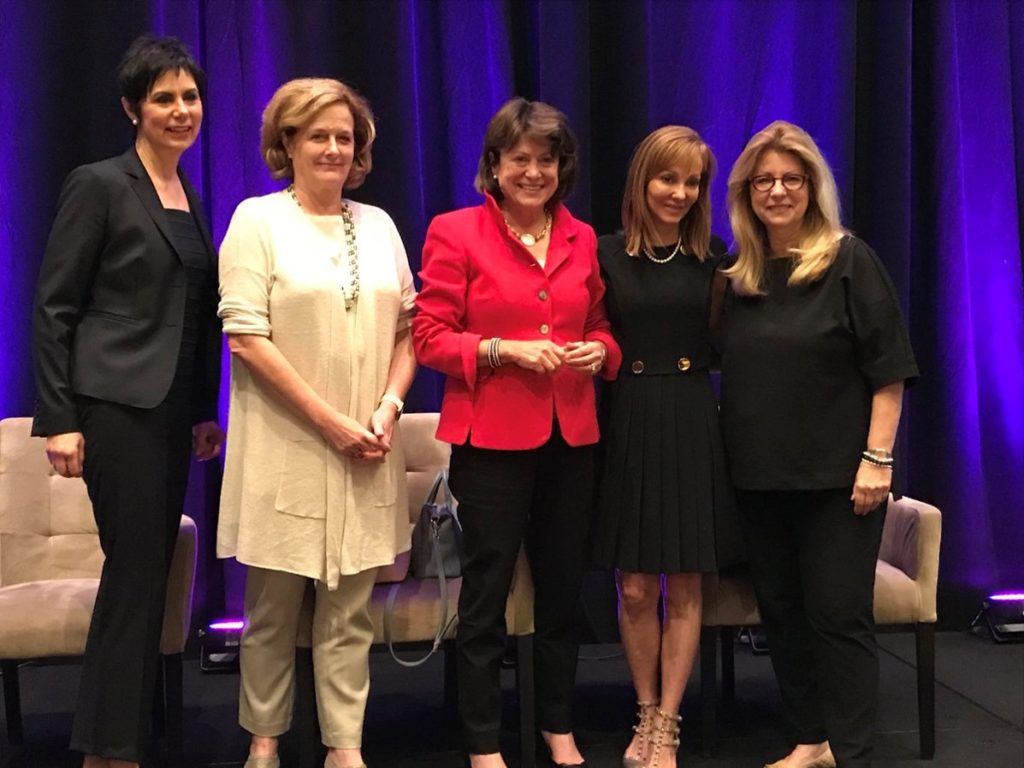
Here we are in 2018, and race, racism, and related polarizing issues are as fresh today as they were back during the Civil Right Movement in the 1960s. Perhaps because of the molten political climate, old wounds, beliefs, and emotions have come roaring back into the forefront.
The same is true for the growing number of conversations and controversies about gender that have taken center stage in the past year. While feminism was a major inflection point decades ago during the days of Gloria Steinem, Betty Friedan, and Bella Abzug – moves and shakers in the world of gender politics – it is back in full force today.
Some of this is most certainly due to the #MeToo movement which took flight last year, and continues to roil American attitudes on both sides of the political aisle, as well as on each end of the kitchen table. It has inflamed the upcoming midterm elections, reformed the way companies hire, fire, and administrate their policies, and even had an impact on the huge media-consuming audience – now more sensitive to gender roles, stereotypes and content.
And so it is in the radio industry, a microcosm of America’s workforce, to be sure. Women’s roles at both the station and corporate levels are in the spotlight, as the entire workforce re-examines its positions, its policies, and feelings.
Now, an extensive new research study from McKinsey & Company and LeanIn.org – “Women In The Workplace: 2018” – sheds much light on how both men and women view many of the same issues. Not surprisingly, the research confirms the long-running truth that woman are more plentiful at lower levels on most company “food chains,” decreasing in number in positions that are more powerful and better compensated.
You can see it clearly on the chart below as women are far less likely to hold management positions than their male counterparts:
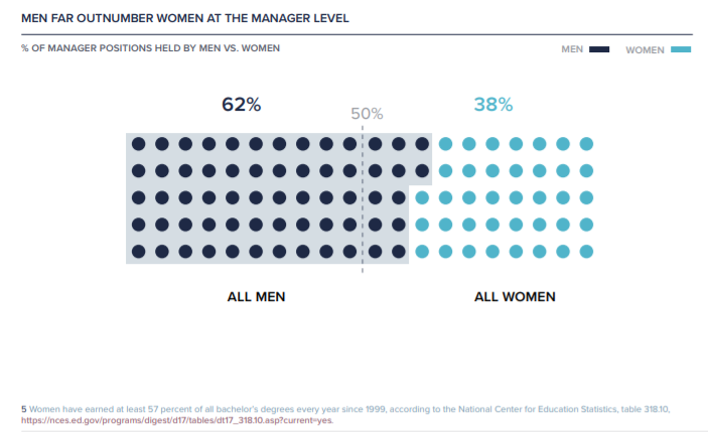
Interestingly, radio’s gender gap may be upside-down. A look at the photo from the 2017 Radio Show at the top of this blog post reveals an impressive group of female executives. Combined, these women greatly determine the course of the medium – week after week. They generate millions and millions of revenue dollars on behalf of their respective companies, while being responsible for thousands of employees throughout their companies.
And this “Gang of Five” don’t represent token women in radio, because the list of female movers and shakers in broadcast radio goes on and on. On the commercial side of the aisle the list also includes Mary Berner (Cumulus), Beth Neuhoff (Neuhoff), Cathy Hughes (Urban One), Julie Talbott (Premiere Radio Networks), Suzanne Grimes (Westwood One), Kim Guthrie (Cox), and many others who hold sway over their companies.
In public radio, women are similarly positioned, such as NPR’s Loren Mayer to PRX boss Kerri Hoffman, Alisa Miller (PRI), Joyce MacDonald (Greater Public), Jody Evans (PRPD), WNYC’s Laura Walker, and a host of others.
And the McKinsey/LeanIn study support this notion – second only to the health care sector, the media and entertianment industry has the highest percentage of women in the C-suite.
Oddly enough in radio, the most visible – or audible – gap often occurs in the air studio, where men greatly outnumber women throughout most dayparts. Even in mornings where women are more numerous, it is often a morning show headed up by a male.
There are notable exceptions, of course, from Delilah to Terry Gross to Laura Ingraham. Women named Ellen K, Roula (of “…and Ryan”), and Mercedes now earn top billing status on morning shows often dominant in their markets..
But there are a lot more guys than gals connected with the on-air product. We saw this in AQ, our study of radio talent, in partnership with Morning Show Boot Camp. More than 1,100 air personalities of all stripes took our online survey. And it revealed a 75:25 edge for men in terms of the talent population in American radio.
Now of course, there’s no official census taken in radio, so we don’t know precisely what the true gender balance is for those behind the mic. But with a sample this robust, I think our numbers ring very true when you consider the station where you work, and who’s moving in and out of the air studio every year.
The McKinsley/LeanIn study is extensive, revealing, eye-opening and worth your time no matter what position you hold in radio. And it brought back memories of a 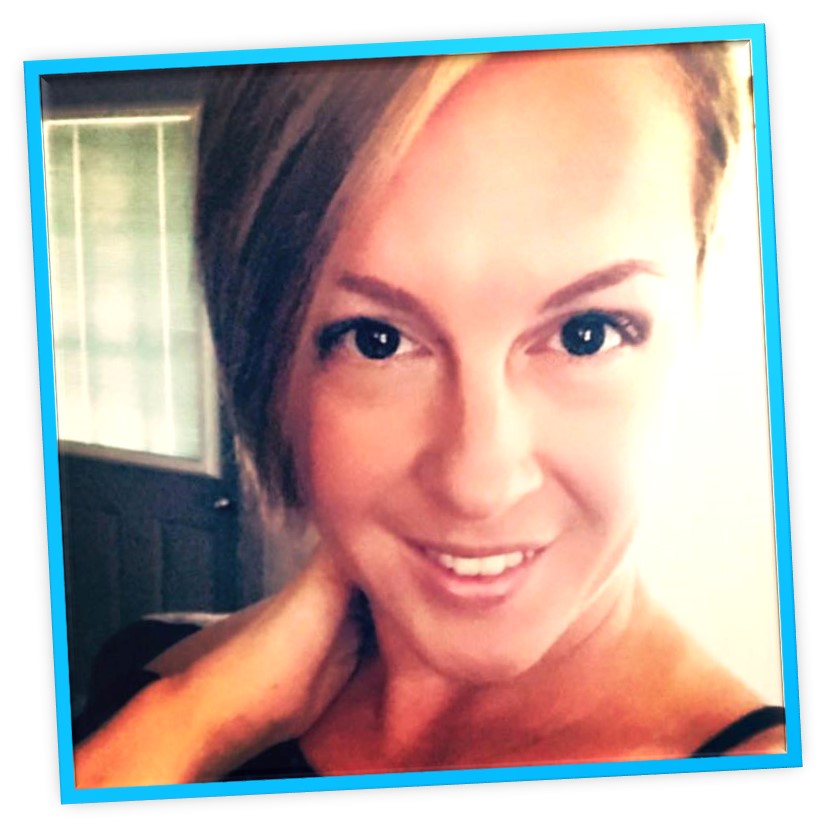 CEO session I saw at Conclave in 2017. When it came time for Q&A, Mandy James – then the female sidekick on WZOK/Rockford’s morning show – boldly stood up and asked the impressive group of industry leaders this question:
CEO session I saw at Conclave in 2017. When it came time for Q&A, Mandy James – then the female sidekick on WZOK/Rockford’s morning show – boldly stood up and asked the impressive group of industry leaders this question:
“If you could change one thing for women in radio, what would it be?”
It caught the panelists off-guard because it’s something that many in radio – especially women – think about, but is rarely vocalized. I later caught up with Mandy and wrote a blog post dedicated to the topic.
As she told me at the time, women in radio “feel like they are second-class citizens, aren’t taken seriously, are left out of management conversations, don’t get credit for their success, miss out on endorsement opportunities because they aren’t the host of the show, get paid less, and handle most of the workload.”
There’s a lot of fascinating data in the McKinsey/LeanIn study that support many of the concerns she expressed that day. One of the things that jumps out at you is the way in which men and women in the workforce have very different views about the exact same things.
It is especially striking when you focus on what the study’s authors call “Women Onlys” – women who are the only (or one of the only) ones in their workplace or on their team. That describes the position of many women on the air at stations all over the country, many of whom are the only full-timers on the airstaff.
The chart below boldly illustrates the “perceptual gender gap” that exists in so many workplaces – including radio stations. It talks about those “aggressions” that so often happen in the office, the warehouse…or in the air studio, as well as what it’s like to be the lone female in the at-work environment.
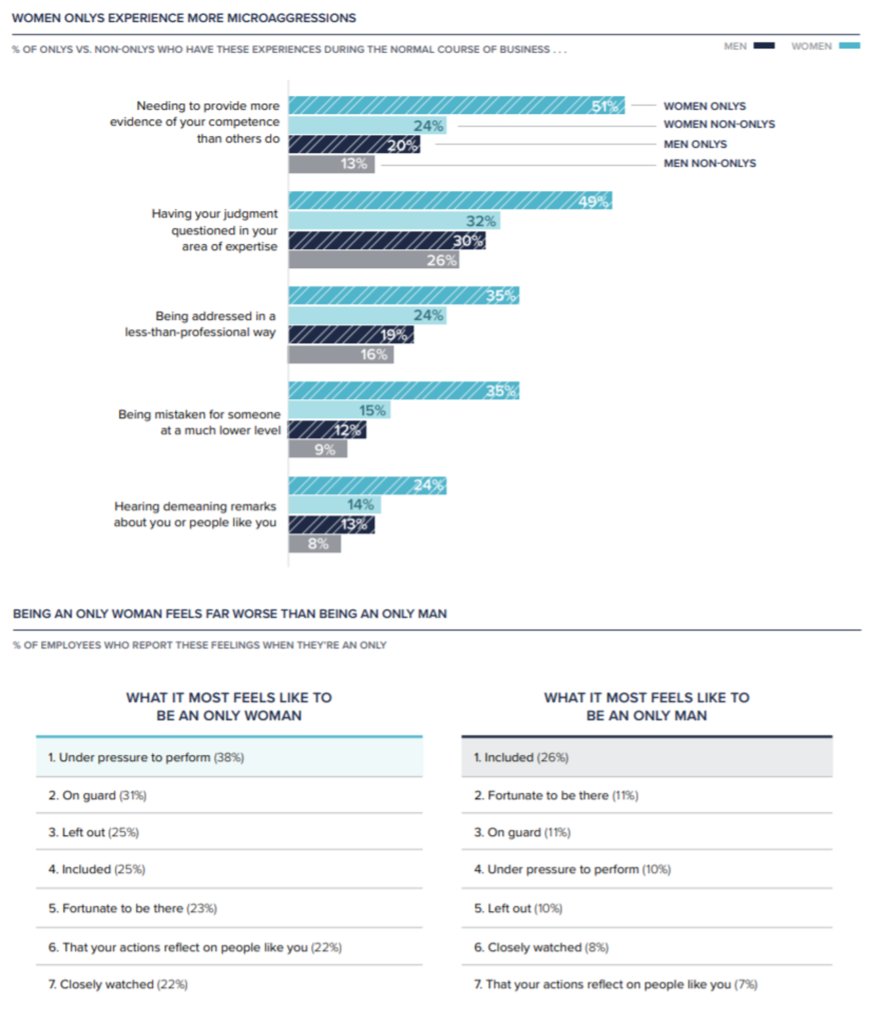
We saw essentially the same “gender gap” in AQ, where our female respondents made their feelings heard about a number of issues. But no data point was stronger than the one below that underscored the differences in how male and female personalities perceive women’s chances to advance on the air.
By more than a 2½ – 1 margin, men agree/agree strongly that women have an equal chance of success in the air studio as men. And a solid majority of female air personalities disagree/disagree strongly with this notion.
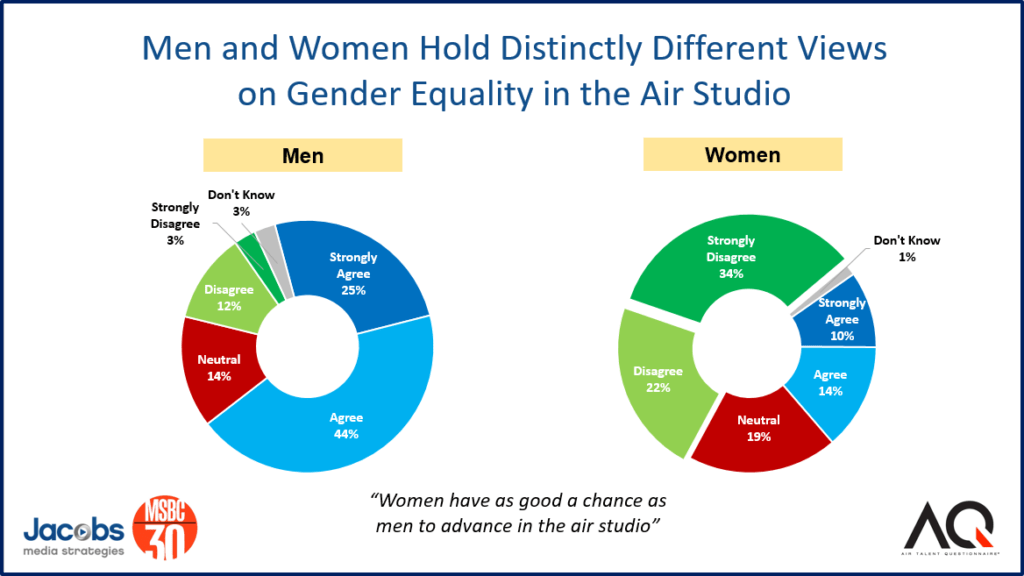
Sometimes it’s convenient to look at #MeToo as a politicized movement that has become a symbol of the highly divided society in which we live. And rather than get into a circular debate or a Facebook rant about it, the perceptions that you see in the broader McKinsey/LeanIn study and our industry-centric AQ research reflect a palpable schism in the workplace that has long been part of the culture in the air studio, and at so many radio stations.
As tech companies paradoxically struggle to have diverse employee bases, broadcast radio can stand out as a shining example of an industry that speaks to everyone by providing a true variety of voices on the air.
I’ll leave you with a final thought from Mandy from the 2017 interview:
“I’m not saying every program director or GM should go out and give every woman at their station a promotion or a raise, but maybe start by advocating for a co-host who wants more air time or an endorsement; if someone asks for the opportunity to learn more about what you do, try to give them some of your time instead of making them feel like they’re just being pushy. The truth is, this isn’t just about putting women in upper management or giving them more air time; we’d all love that, but what the majority of women in this industry want the most, the one thing they would change, is to just be treated like an equal.”
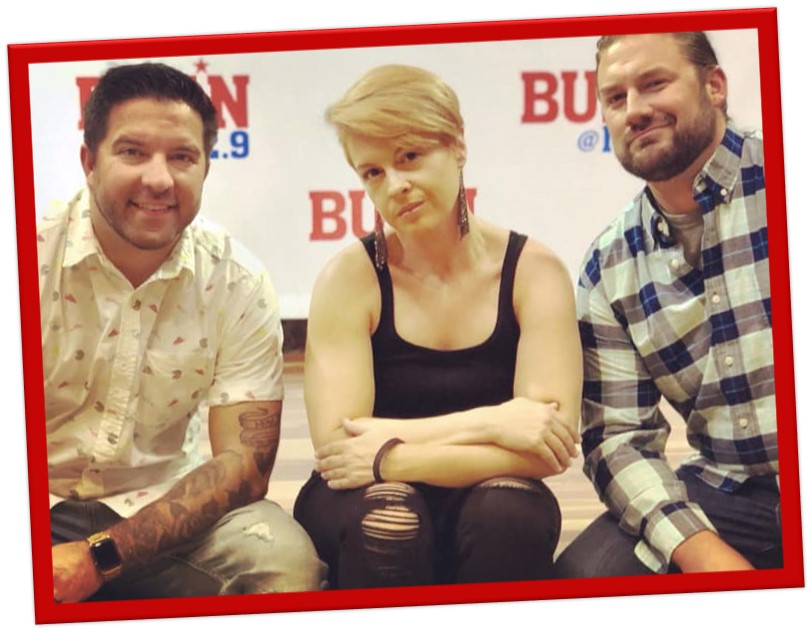
Postscript: This month, Mandy James returned to her Minnesota home to star on the new morning show on Entercom’s Country Buz’n 102.9. For Mandy, it’s not just a jump to a large market, but a chance to make waves in morning radio on a big stage. If I was one of her co-partners – Mike “Dubs” or “PT” – I’d be sure to give her lots of room.
Postscript II: You can watch our AQ webinar here.
You can access the McKinsey/LeanIn study here.
- The Digital Dash In 2025: Now You See It - March 3, 2025
- Radio: Don’t Get Scammed By “The 3-Minute Monte” - February 28, 2025
- “I Watch A Lot Of Baseball On The Radio” - February 27, 2025




10/26/2018
I graduated in May from a radio and television degree program. I am female, 62, and a veteran regional print media multimedia journalist, with 16 years experience in that realm. One aspect of the gender gap in broadcasting not addressed here is in the gender gap appallingly present in the college classroom.
At the beginning of the program, there were 12 students in the program -three of whom were female. At graduation this past May, I looked around and asked myself “Where is everybody?” Five of us gradated, and I was the last woman standing. Why is that?
Because one of the two instructors would close the door in the control room to yuck it up with the teenage boys and close the women out. There was an extreme gender bias as to who got feedback, use of equipment and respectful treatment. I have heard from colleagues after graduation that stations are hiring men who have each other’s backs as stations close and people become unemployed.
I just want a chance to show what I can do. I had a three hour morning commute show with classic rock and in-depth interviews every Friday morning that was received well with much positive feedback.
I now have to pay rent and car payments, like every other adult. I need this garbage to change now. My attitude comes from experiential knowledge.
I would not have believed it if I hadn’t lived through two years of it.
Francine, thanks for taking the time and having the courage to discuss your experience. To me – as a man and one who taught on the college level – it is both surprising and truly disappointing. At the risk of getting pilloried in this space by angry commenters, however, I can tell you the male PDs I work with in radio have a hard enough time just finding great talent for their stations. There isn’t enough talent to go around to be narrowing your focus to just hiring one type of person.
Congrats on your perseverence on gutting it out through this program, and best of luck to you in your quest to find meaningful employment in the radio industry. Thanks again for the comment.
10/26/2018
Thank you, Mr. Jacobs. I am also seeking employment in television news, because I still believe journalism its an honorable profession and that some of us take informing the public as a sacred trust.
I am certainly not going let the gender climate in the industry in upstate New York stop me now. It’s looking as though I may have to move.
Francine, a lot of people read this blog, so you never know. Francine’s email is [email protected]
Fred, about 2 1/2 hours southwest of Detroit, WOWO radio just made a giant leap forward by promoting our news and program director to anchor Fort Wayne’s Morning News. It also represents a generation shift along with the gender shift. More details are at: https://www.scotthoward.me/a-new-era-at-wowo-radio/
LOVE this post Fred. Thanks for all you do.
The biggest challenge for women in radio, to me anyway, is in the Program Director chair. Currently, female PD’s represent only 11% of all radio. And that number has stayed flat for the last decade.
Here’s a link to the MIW gender study: https://www.radiomiw.com/press-releases-news/2018/2/5/2017-gender-analysis-study-released
I’m proud that Nielsen Music, along with the MIWs, have started a new Mentorship program for women in programming, but it’s just scratching the surface. If half of our audiences are women, then shouldn’t at least half of the Brand Managers be too??
One of the your biggest fans!!
Haley, thanks for the kind comments and taking the time to chime in. It continues to be an issue, and you are correct about the PD count. Thanks for the study link and letting us know about the mentorship program, Haley. This is where it starts.
I concur with Haley and Francine. The gender study Haley is talking about reports that these statistics have not changed in over 10 years. I have brought it to the attention of several radio execs over the last few years and it seems to fall on deaf ears. What can we do to groom and entice more women to program radio? I’ve been in this business for over 20 years and it has been a struggle. Sadly, Francine’s observations reflect truth. I’m sure you’ve heard this a lot lately, but it’s “time to change the conversation.”
Charese, appreciate you joining this conversaation. As someone who has successfully programmed radio stations as a PD and Ops Director, you have a unique POV. Francine’s observations were disturging, but not surprising. We’ve got a long way to go, but I would have that with the many women now occupying corner offices, that will change. Thanks again.
November 2, 2018
I appreciated Charese’s affirmation that I am dealing with reality in the industry. Other aspects to address are ageism and pay scale differential. I am now taking a seasonal job at Target because it pays more hourly in the Capital Region of Albany, NY than on-air reporting does.
I am blessed to report that for the moment, I still have a roof over my head. I am not going to stop looking for an open door in television and radio because I am 62 and female.No apologies.
The Labor Department held a class last week on what is termed “weeding and seeding”, meaning cutting those over 50 to hire younger employees at a lower rate. I love this work and am not going to stop trying to find a home at a station that appreciates someone regardless of gender or age, who can consistently generate compelling, accurate content in a voice that the listener believes.
Francine, thanks for the comment & kudos on your perseverence. WMGK’s Debbi Calton mentioned the pay differential issue on my Facebook page today. We are planning on reprising our air talent survey next spring, and I will start thinking about ways in which we can tackle this issue. Thanks again.